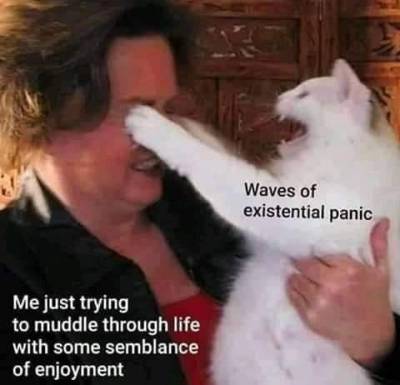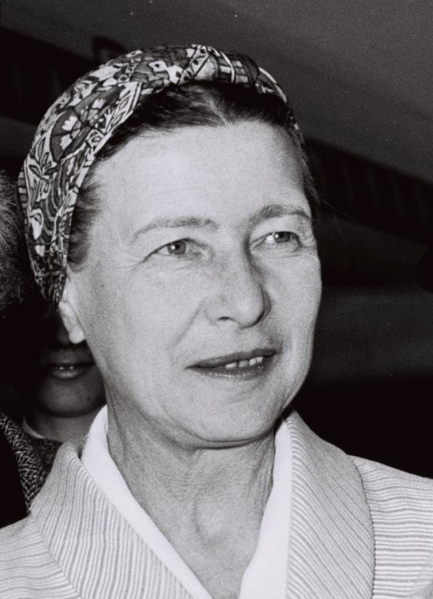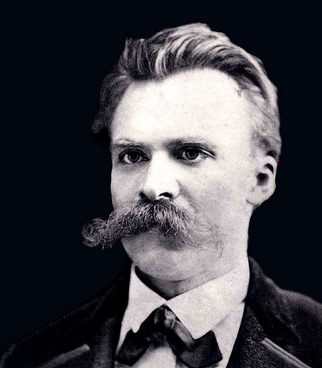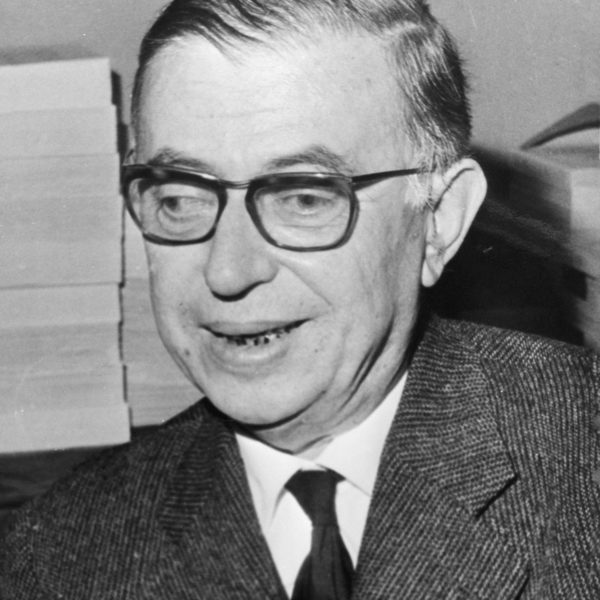Existentialism

Why are we here anyway? Why am I here, at 1:00 AM, writing a paragraph about existentialism for high school students? Well, according to the existentialists, there is no reason why we’re here, but that isn’t a bad thing. If we have no inherent purpose in life, we’re free to choose whatever purpose we want!
Existentialism is a philosophical movement that began in the 1800s by Danish Dynamo Søren Kierkegaard and Hot Topic rewards-card member Friedrich Nietzsche, with contributions from Fyodor “The Hammer” Dostoevsky. These cats laid the foundation for existentialism. Existentialist texts share in common a focus on the freedom and creativity of the individual. Existentialists do not believe the universe has an inherent meaning, nor do they believe people have a fixed definition or purpose. According to existentialists, humans were thrown into the river of life without a paddle and are told “just do your best; also, good luck pal.” At least humans are free to choose whether or not they feel like swimming. No matter the reason, the human simply needs to follow whatever they believe, which is epic.
Videos
Existentialism: Crash Course Philosophy #16
Crash Course
-
 Existentialism: Crash Course Philosophy #16
Existentialism: Crash Course Philosophy #16
-
 Existentialism on Prom Night
Existentialism on Prom Night
-
 Henri the Cat
Henri the Cat
-
 Henri the Cat, part 2
Henri the Cat, part 2
-
 Sartre
Sartre
-
 PHILOSOPHY – Soren Kierkegaard
PHILOSOPHY – Soren Kierkegaard
Pop Culture Examples
Want to Know More?
-
Existentialism
Internet Encyclopedia of Philosophy -
Exploring Existential Angst and the Self in Social Media
PLATO Lesson Plan
Questions to Think About
-
Does the human being have a purpose in the universe?
-
Does the human individual have an essence or definition?
-
What do our emotions, such as anxiety or dread, tell us about our lives or the human condition?
-

What does it mean to be free? Can we choose not to be free?
-
What does it mean to live an authentic life?
-
Does life have a purpose? Does life have meaning?
Key Thinkers
-

Simone de Beauvoir
-

Albert Camus
-

Karl Jaspers
-

Søren Kierkegaard
-

Friedrich Nietzsche
-

Jean-Paul Sartre
“Jean-Paul Sartre, Simone de Beauvoir, Avraham Shlonsky and Leah Goldberg” by Government Press Office (GPO) is licensed with CC BY-NC-SA 2.0. To view a copy of this license, visit https://creativecommons.org/licenses/by-nc-sa/2.0/. https://www.flickr.com/photos/69061470@N05/6470403371
“Albert Camus” by DietrichLiao is licensed with CC BY-SA 2.0. To view a copy of this license, visit https://creativecommons.org/licenses/by-sa/2.0/. https://www.flickr.com/photos/8875400@N06/2513316191
“Karl Jaspers” by On Being is licensed with CC BY-NC-SA 2.0. To view a copy of this license, visit https://creativecommons.org/licenses/by-nc-sa/2.0/. https://www.flickr.com/photos/42773169@N00/3651965519
“Kierkegaard” by ThomasThomas is licensed with CC BY-NC 2.0. To view a copy of this license, visit https://creativecommons.org/licenses/by-nc/2.0/. https://www.flickr.com/photos/74078214@N00/504370338
“Friedrich Nietzsche: ‘Hoy no somos el mismo hombre de ayer y mañana volveremos a ser otro.'” by Antonio Marín Segovia is licensed with CC BY-NC-ND 2.0. To view a copy of this license, visit https://creativecommons.org/licenses/by-nc-nd/2.0/. https://www.flickr.com/photos/23465276@N04/19888500939
“File:Jean Paul Sartre 1965.jpg” by Materialscientist via WIkimedia Commons is licensed with CC BY-SA 3.0. To view a copy of this license, visit https://creativecommons.org/licenses/by-sa/3.0/. https://commons.wikimedia.org/w/index.php?curid=37090710
Key Texts
Key Terms
-
- Alienation
- the feeling that one is not at home in the world
-
- Anxiety
- results from the awareness of one’s own freedom
-
- Being-for-itself
- consciousness, awareness of one’s existence
-
- Being-in-itself
- thingness, facticity
-
- Essence
- the definition or purpose of something, what it is
-
- Existence
- the fact of something, that it is; for existentialists, existence precedes essence, which means that humans first exist and then define themselves or give their lives purpose
-
- Facticity
- concrete facts of one’s human existence
-
- Freedom
- ability to change one’s situation
-
- Immanence
- one’s givenness or facticity
-
- Transcendence
- the ability to go beyond one’s given situation









